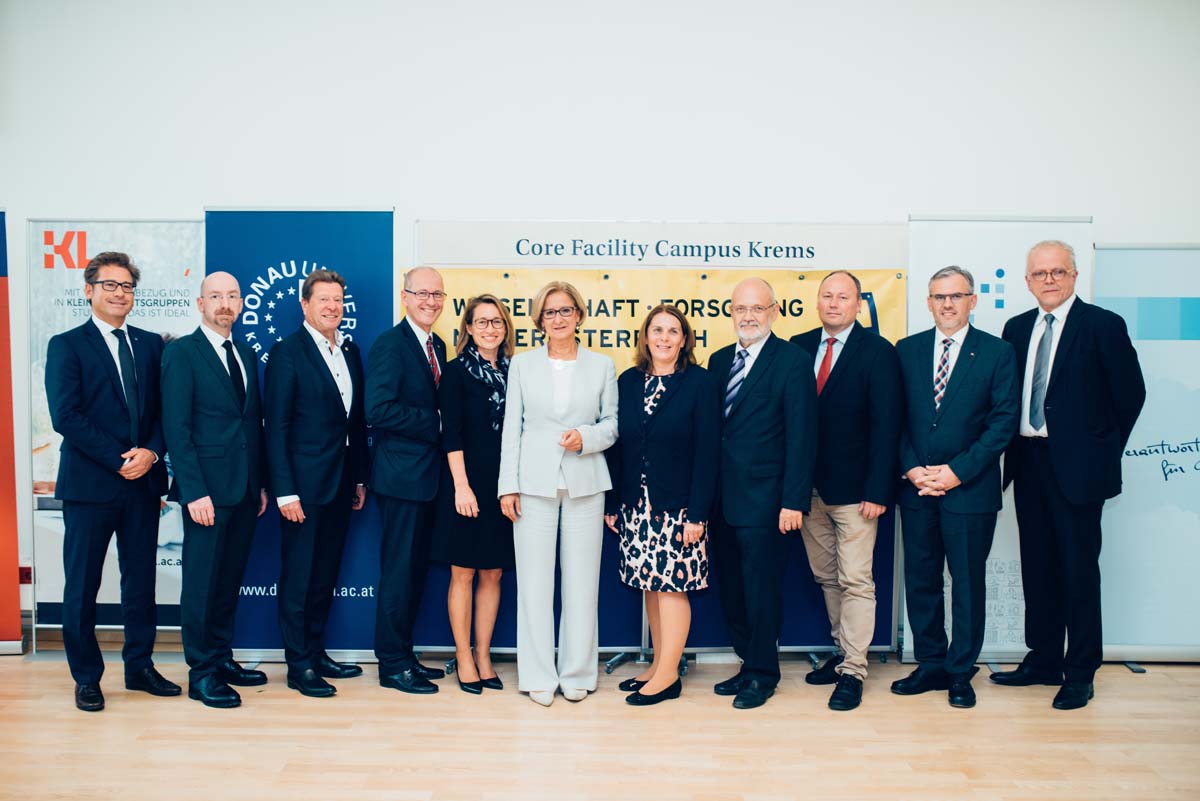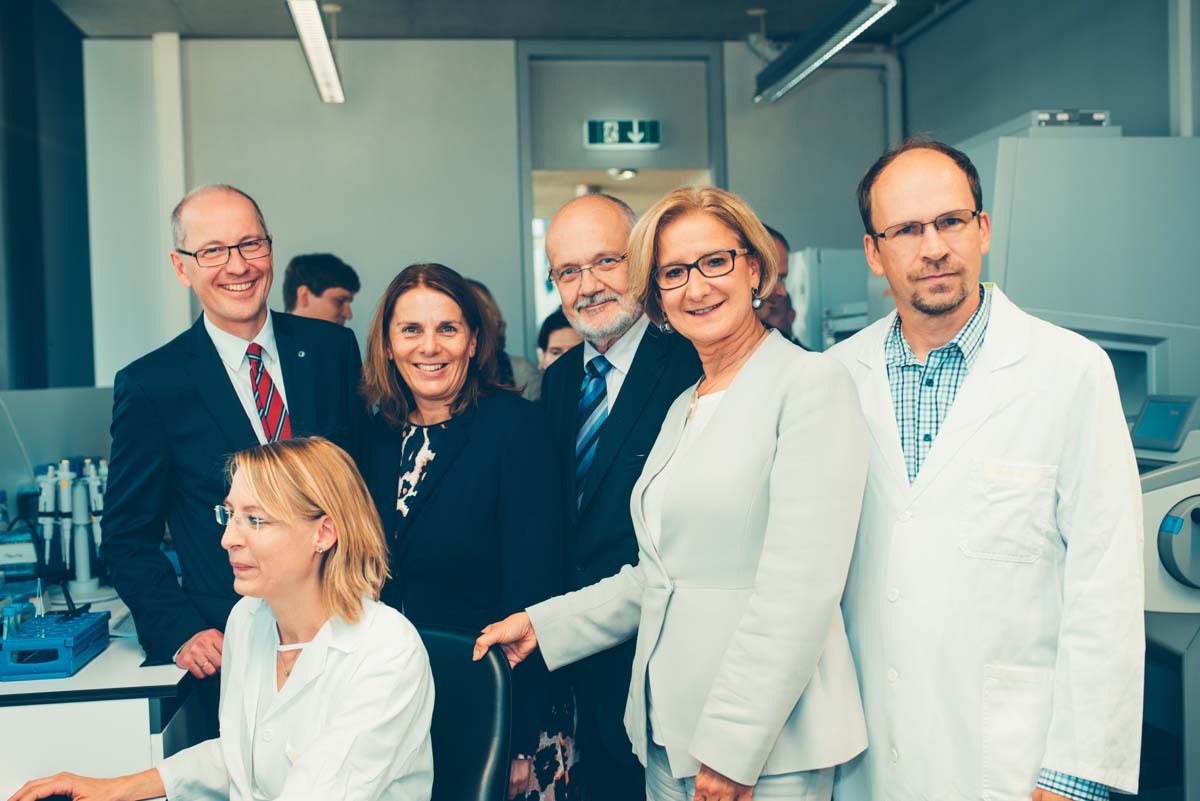On 9 October the Core Facility at Campus Krems was opened with a ceremony attended by Governor Johanna Mikl-Leitner. At two Krems campuses the state-of-the-art large-scale facilities are from now on available for research in the fields of bioimaging and cell analysis as well as biomechanics and tissue engineering. The new research infrastructure, financed with around 3.2 million euros by the Province of Lower Austria, the Lower Austrian Health and Social Fund (NÖGUS), will be used by Danube University Krems, the Karl Landsteiner Private University for Health Sciences and the IMC University of Applied Sciences Krems. It is intended to expand the range of methods and support the existing connection to international medical research.
"The opening of the Core Facility Krems stands for immense opportunities good cooperation enables, and Campus Krems in particular is a place of living cooperation," Governor Johanna Mikl-Leitner emphasized.
The Core Facility provides human and biomedical research at the three Campus Krems universities an electron microscope with a resolution of 4 nanometres, a confocal laser scanning microscope, a flow cytometer, a nanoparticle tracking analysis device, a bioanalyzer, static and dynamic material testing machines, tissue preparation equipment, a CNC portal milling machine and a MicroCT system that is unique in Austria.
"Unaffordable for the individual institutions, the Core Facility enables the scientists to implement their research projects based on a variety of methods," says Prof. Dr. Viktoria Weber, Vice Rector for Research at Danube University Krems, underlining the successful cooperation between Danube University Krems, Karl Landsteiner Private University for Health Sciences and IMC University of Applied Sciences Krems. The new infrastructure, as the Vice-Rector continued, also promotes opportunities for cooperation, scientific exchange, and the development of new research fields with an even better applicable transfer of findings joining other institutions. As a result innovation can arise.
Prof. Dr. Rudolf Mallinger, Rector of the Karl Landsteiner Private University for Health Sciences, highlighted in his opening speech: "The Core Facility is an extraordinary institution for building research activity of the still-young Karl Landsteiner Private University. Above all, its value is of great importance regarding the close cooperation between the facilities on the campus.“
Ulrike Prommer, Managing Director of IMC University of Applied Sciences Krems: "Opening the Core Facility at Campus Krems further strengthens the cooperation of the campus institutions in teaching and applied research. We are happy and grateful that this long planned cooperation came into realization throughout the support of the Province of Lower Austria, and that it now stands as strong foundation for all our students and teachers to build on. The Campus universities’ cooperation enables a lively exchange of innovative and creative research ideas in a scientific context to subsequently develop in a practical and successful manner. In terms of this development it is essential and indispensable to use this joint up-to-date infrastructure.”
Two locations, joint use
The new large-scale facilities will primarily benefit the two research fields of bioimaging and cell analysis as well as biomechanics and tissue engineering. They are located at two locations on the campus and complement the equipment of the Biomedical Laboratory at Danube University Krems and the Laboratory of the Karl Landsteiner Private University for Health Sciences. The scientists from the three universities can jointly use the entire equipment, which is also available for external partners.
Inflammation and material compatibility as a cross-section
The three institutions participating in the Core Facility approach inflammation, a cross-cutting topic, i.e. the field of inflammation, differently. Sepsis therapy, the contact of tissue with biomaterials, as well as topics of regenerative medicine are the focal points. Another cross-sectional topic is the testing of biomaterials for their compatibility for clinical use. Here, research is called upon to prove whether incompatibilities or inflammations might occur in tissues.
Devices open up new spectrum of methods and ensure competitiveness
The new equipment on Campus Krems opens research opportunities at the three universities on Campus Krems to expand their range of methods significantly and leads to answers by using modern analytical methods as well as visualizations in bioimaging and cell analysis. The MicroCT utilized in biomechanics enables non-destructive material testing, and the new laboratory equipment at the Karl Landsteiner Private University for Health Sciences is unique in Austria in this combination.
Thus the new Core Facility also provides the basis for publication of scientific findings at the highest level. At the same time, it promotes young scientists, who can familiarize with the latest medical science methods at Campus Krems.
Connection to top international research
"The Province of Lower Austria has not only created a state-of-the-art research infrastructure by funding the Core Facility, but has also ensured that the Campus Krems universities are connected to top international research and EU-funded research projects," said Friedrich Faulhammer, Rector of Danube University Krems, on the occasion of the Core Facility’s opening. Faulhammer also emphasized the successful cooperation between the three participating universities. Danube University Krems as a public university, the Karl Landsteiner Private University as well as the IMC Krems, a university of applied sciences, had successfully joined forces to realize a joint research infrastructure. "This investment strengthens research at the Krems science location," Faulhammer closes.
Building block of Lower Austria's FTI strategy
The Core Facility is a concrete implementation of the Lower Austrian FTI strategy. The Core Facility was established with funds from the Lower Austrian Research, Technology and Innovation Program and the Lower Austrian Health and Social Fund (NÖGUS).
Queries
Tags







_Skokanitsch_Magnolia%20(210x280px).jpg)